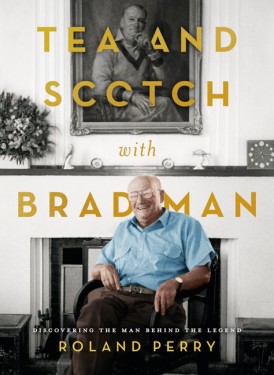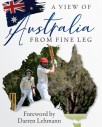Tea and Scotch with Bradman
Jonathan Northall |Published: 2019
Pages: 335
Author: Perry, Roland
Publisher: ABC Books
Rating: 4 stars

Roland Perry is not a stranger to the Sir Donald Bradman story. Tea and Scotch with Bradman is Perry’s latest offering on Australia’s greatest ever cricketer and serves up a sympathetic portrait. The book is, overall, enjoyable with much insight into the psyche of Bradman. In essence, it is a story about the telling of Bradman’s story. Lines such as “He gave them [opponents] the highest respect by crushing them” hint at Bradman’s modus operandi on the cricket pitch. Also, the book delves into Bradman’s private life and how it affected his family.
The book explores the psychology of Bradman being Bradman (perhaps an insight into Steve Smith’s internal dialogue?). Perry’s relationship with Bradman, engendered over a period of years, gave the author access that no other person managed. Perry matches Bradman’s disclosed doctrines/value system to a well-written history of his playing days – the ‘what’ is well known, the ‘why’ less so. Short, sharp chapters keep the narrative flowing.
Hearing about Bradman’s personal loss in 1936 and the resultant Test series was fascinating – Bradman’s early captaincy is explored (personal tragedy, resentment and jealousy). This insight is where the book excelled; learning how Bradman operated and how that manifested into cricket is a joy. However, Perry sometimes allows his genuine warmth for the subject to come through, and it detracts from the argument being explored. Perry could have further studied Bradman’s tactic of dropping himself down the order. He explained that a captain protects his best batters, of which Bradman himself was, without doubt, the best, but it could have been further scrutinised. Bradman’s pragmatism had already been explored in the chapter.
Hearing Bradman’s own words about his playing days make the book worthwhile. Bradman’s equanimity is unparalleled – the simplistic complexity of a man who was nonpareil. Again, parallels to Steve Smith very much come to mind. Also, we are witness to the juxtaposition of Bradman the cricketer and Bradman the human – for example, exploring his love of music. It helps to paint a more three-dimensional portrait of ‘The Don’.
One of the aspects of Bradman’s life I was keen to understand was the relationship with Kerry Packer. Early in the chapter, Perry nails his colours to the ‘Establishment’ mast. I was hoping for a less subjective view of the relationship. For example, Perry states that Richie Benaud had been “seduced” by Packer’s money. There is an irony that the schism between the ACB and WSC still hasn’t fully healed in certain quarters even though it’s over 40 years since the event. Perry is allowed, of course, to take his side but it doesn’t help the book.
From this point, I felt that the book does change tactic. Perry is a talented writer, but his relationship with Bradman has influenced his reasoning. There is a chapter on Bradman’s attitude to fame where it is interestingly paralleled to Ron Barassi. This is a fascinating exploration of how greatness is dealt with differently. Compare that to a chapter on Bradman being funnier than George Burns, which could be a measure of the endearment from Perry, feels obsequious and unnecessary.
There is a chapter in the book which explores how Bradman’s best XI (another one of Perry’s books) was received. Frustratingly, it continued to see Perry act as defender against, and sometimes attacker of, critics of Bradman. At this point, I started to experience feelings of disappointment.
The book ends with Perry offering a personal recollection of a dream of Bradman dying which coincided with his actual death in 2001. I was not sure how I, as a reader, was supposed to feel with this disclosure. Clearly, the author and subject had warmth and bonhomie with each other. Perry’s book managed to utilise this for extensive periods of the book to the reader’s benefit. Occasionally, it polarises your opinion, and I’m not a fan of such a tactic.
Overall, the book is very readable and brings many insights about Bradman that will help to flesh out the man who was far more than the statistic of 99.94. However, be prepared to take sides as you delve deeper into the book. Perhaps try reading those chapters with a tea and scotch to hand.




Leave a comment